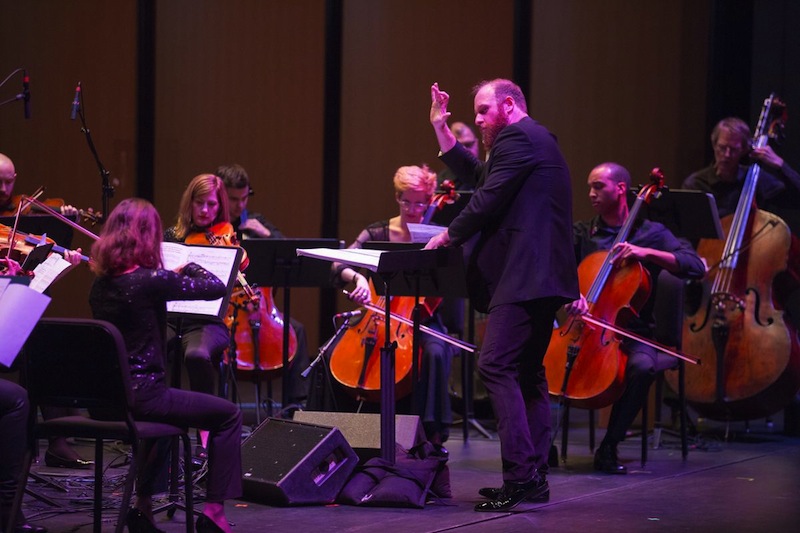Worlds collide, compellingly, in a new era for MusicNOW

The new season of MusicNOW, the Chicago Symphony Orchestra’s contemporary music series, got off to an invigorating start Monday night at the Harris Theater for Music and Dance.
With the arrival this year of two new CSO composers-in-residence, Elizabeth Ogonek and Samuel Adams, the annual series is under new management. The new music scene is dizzyingly diverse these days, and Ogonek and Adams have omnivorous tastes.
But Monday’s concert, titled “Unstrung” and devoted solely to music for strings, had a reassuringly clear focus. Running a brisk 90 minutes with no intermission, the program allowed listeners to find that sweet spot between excitement at hearing something new and feeling lost amid torrents of unpredictable sound.
The format was slick, in the very best sense of the word. Short, lively video interviews with composers or performers preceded each of the three pieces. The pacing was nicely varied, opening with Daniel Wohl’s Glitch for string quartet and electronics, moving on to Petals for solo cello and electronics by Kaija Saariaho, and closing with Law of Mosaics, a larger-scaled work for string orchestra by Chicago-based composer Ted Hearne. Ogonek and Adams offered a few words of welcome, but there were none of those sometimes awkward live interviews with the evening’s composers. Intervals between works were short, and the printed program was a welcome source of information.
It is the music, of course, that ultimately makes the evening, and Monday’s performance offered bracing performances of pieces well worth hearing.
Composed in 2009, Glitch is a four-movement piece exploring Wohl’s fascination with what he described as “the tension between noise and beauty.” The work opened with taped music for string quartet, a slow, noble melody soon accosted by sharp slashes and madly scurrying cascades from the four live musicians—violinists Gina DiBello and Qing Hou, violist Catherine Brubaker and cellist Katinka Kleijn. Throughout the piece, Wohl reveled in the flaws inherent in every recording device—the hisses and pops of vinyl, the skips of a scratched CD. They erupted erratically, like wild creatures or playful imps. But amid the often piercing tension and maniacal drive, Glitch retained a poignant, even stately undercurrent. Undeterred, its long, lyrical melodies unfurled amid the sonic storms, heroic and determined.
That sense of unwavering calm suffused Saariaho’s Petals, a short piece from 1988 inspired by Claude Monet’s waterlilies. Kleijn created an intensely intimate mood, drawing us in with barely audible whispers and slow, widely spaced strokes that rasped and rustled like a wind sweeping a tall-grass meadow.
Hearne’s Law of Mosaics, with the 20-member orchestra led by Christopher Rountree, unabashedly played with the idea of sampling. Throughout its six movements, we heard snatches of Vivaldi and Bach, Mahler and Barber and who knows who else. The third movement’s title spelled it out clearly: “Climatic moments from Adagio for Strings and The Four Seasons, slowed down and layered on top of one another.” Which, indeed, it was, making for an intriguing piece of music in its own right.
During the second movement, “Palindrome for [composer] Andrew Norman,” the mashup of lush, Mahler-like romanticism and urgent, disorienting short fragments grew tiresome. It verged on becoming a compositional gimmick rather than a rewarding contrast between musical ideas.
But overall, Law of Mosaics, composed in 2012, bristled with energy and verve. Skillfully shaped by Rountree, it explored intriguing contrasts between the familiar and the unfamiliar, the balanced and the off-kilter. Hearne invited us to think about those things, and the performance left us contemplating satisfying questions about the contrasting values of hummable tunes and disrupting outbursts, distraction and concentration. Nourishment for the brain as well as the ear, a good launch for a new era at MusicNOW.
Posted in Performances




